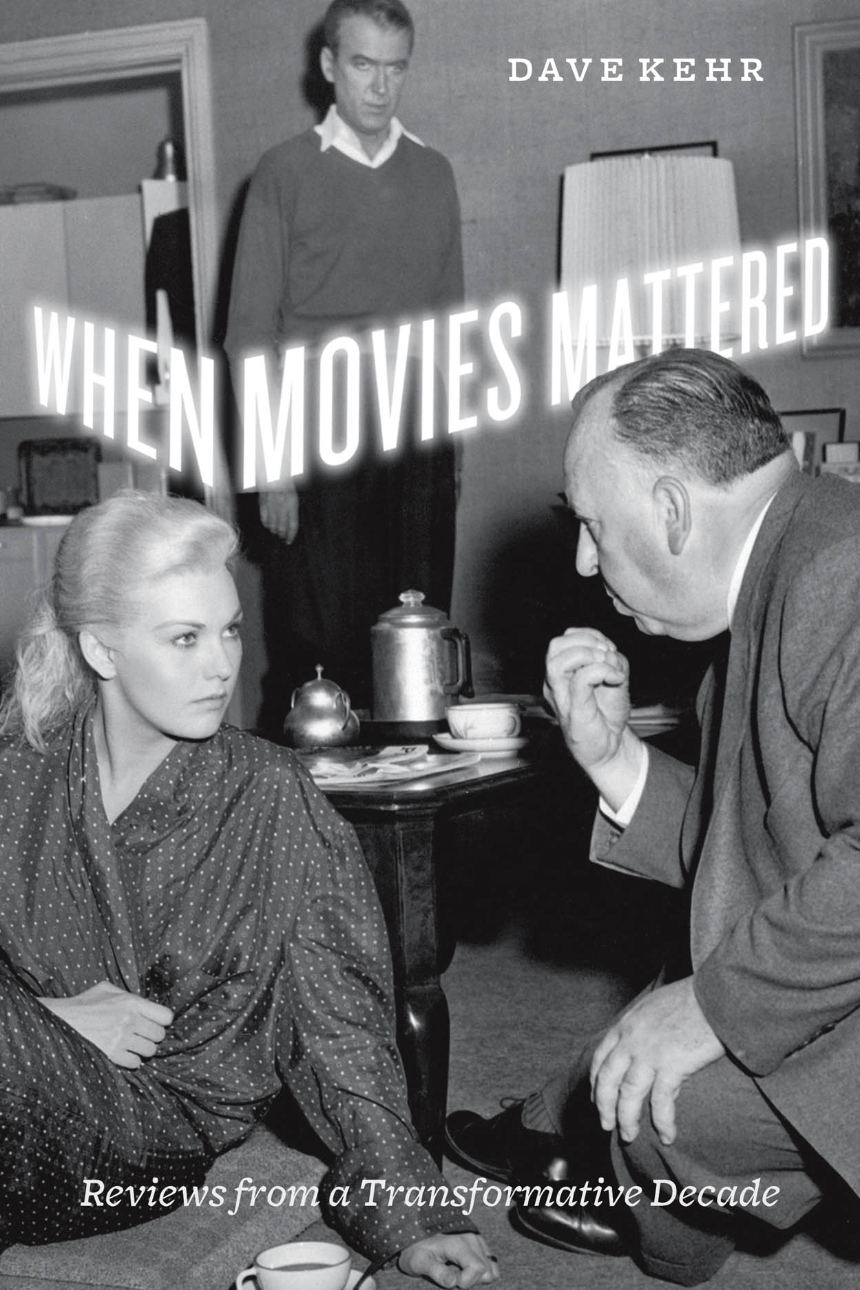When Movies Mattered
Reviews from a Transformative Decade
If you have ever wanted to dig around in the archives for that perfect Sunday afternoon DVD and first turned to a witty weekly column in the New York Times, then you are already familiar with one of our nation’s premier film critics. If you love movies—and the writers who engage them—and just happen to have followed two of the highest circulating daily papers in the country, then you probably recognize the name of the intellectually dazzling writer who has been penning pieces on American and foreign films for over thirty years. And if you called the City of the Big Shoulders home in the 1970s or 1980s and relied on those trenchant, incisive reviews from the Chicago Reader and the Chicago Tribune to guide your moviegoing delight, then you know Dave Kehr.
When Movies Mattered presents a wide-ranging and illuminating selection of Kehr’s criticism from the Reader—most of which is reprinted here for the first time—including insightful discussions of film history and his controversial Top Ten lists. Long heralded by his peers for both his deep knowledge and incisive style, Kehr developed his approach to writing about film from the auteur criticism popular in the ’70s. Though Kehr’s criticism has never lost its intellectual edge, it’s still easily accessible to anyone who truly cares about movies. Never watered down and always razor sharp, it goes beyond wry observations to an acute examination of the particular stylistic qualities that define the work of individual directors and determine the meaning of individual films.
From current releases to important revivals, from classical Hollywood to foreign fare, Kehr has kept us spellbound with his insightful critical commentaries. When Movies Mattered will secure his place among our very best writers about all things cinematic.
Reviews
Table of Contents
Introduction
Part 1: The Best
1974: Le Petit théâtre de Jean Renoir (Jean Renoir)
1976: Family Plot (Alfred Hitchcock)
1977: F for Fake (Orson Welles)
1978: Days of Heaven (Terrence Malick)
1979: 10 (Blake Edwards)
1981: Melvin and Howard (Jonathan Demme)
1982: The Aviator’s Wife (Eric Rohmer)
1983: Francisca (Manoel de Oliveira)
Part 2: The End of Classical Hollywood
Classical Hollywood
The Man Who Would Be King (John Huston)
Fedora (Billy Wilder)
Escape From Alcatraz (Don Siegel)
The Human Factor (Otto Preminger)
New Hollywood
The Driver (Walter Hill)
Halloween (John Carpenter)
Reds (Warren Beatty)
Sudden Impact (Clint Eastwood)
New Directions in Comedy
Victor/Victoria (Blake Edwards)
Risky Business (Paul Brickman)
Lost in America (Albert Brooks)
After Hours (Martin Scorsese)
Mavericks and Outsiders
Dawn of the Dead (George Romero)
The Big Red One (Samuel Fuller)
Love Streams (John Cassavetes)
Trouble in Mind (Alan Rudolph)
Part 3: Other Visions
Old Masters
Blaise Pascal (Roberto Rossellini)
A Piece of Pleasure (Claude Chabrol)
That Obscure Object of Desire (Luis Buñuel)
Perceval (Eric Rohmer)
Godard
Numéro deux
Every Man for Himself
Passion
Detective
New Masters
Jonah Who Will be 25 in the Year 2000 (Alain Tanner)
The Memory of Justice (Marcel Ophuls)
Allegro non troppo (Bruno Bozzetto)
The American Friend (Wim Wenders)
Loulou (Maurice Pialat)
Eijanaika (Shohei Imamura)
Coup de torchon (Bertrand Tavernier)
City of Pirates (Raul Ruiz)
Part 4: Revivals and Retrospectives
The Story of the Last Chrysanthemums (Kenji Mizoguchi)
The Flowers of St. Francis (Roberto Rossellini)
Born in Germany, Raised in Hollywood: The Film Art of Fritz Lang
Record of a Tenement Gentleman (Yasujiro Ozu)
Peeping Tom (Michael Powell)
Othello (Orson Welles)
Crisis, Compulsion, and Creation: Raoul Walsh’s Cinema of the Individual
A Love That Caresses the Soul: Films by Carl Theodor Dreyer
When a Woman Ascends the Stairs (Mikio Naruse)
Le Silence de la mer and Bob le Flambeur (Jean-Pierre Melville)
The Leopard (Luchino Visconti)
Hitch’s Riddle: On Five Rereleased Films
Once Upon a Time in the West (Sergio Leone)
French Cancan (Jean Renoir)
Appendix: Top Ten Lists, 1974–86
